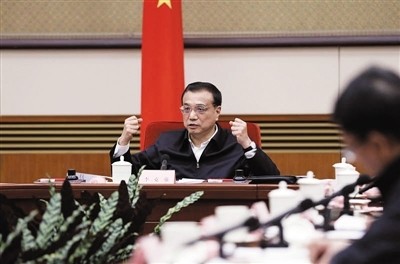
Reuters reports that China's economy faces great challenges and new uncertainties brought about by the global economic environment and various countries' ailing stock markets, Premier Li Keqiang said on Monday. As well as maintaining stable levels of employment, China must be highly vigilant and maintain financial market stability, Li said. Li's comments were published in state media in an article picked up by China's official government website. The comments come after China reported economic growth of 6.9 percent for 2015, its weakest in 25 years. A slew of economic indicators has sent mixed signals to markets at the start of 2016 over the health of China's economy. "The current international market's continued downturn puts great pressure on China's economy," Li said. But he said there was still great potential and plenty of room to maneuver given the country's high savings rates.
Reuters reports that China's foreign ministry on Monday urged the United States and North Korea to sit down with each other face-to-face and resolve their problems, as tension continues to climb on the Korean peninsula after North Korea's latest rocket test. While China was angered by the launch, it has also expressed concern at plans by Washington and Seoul to deploy an advanced U.S. missile defense system, saying it would impact upon China's own security. "The focus of the nuclear issue on the peninsula is between the United States and North Korea," Chinese Foreign Ministry spokesman Hong Lei told a daily news briefing.
The Diplomat comments that the element of signaling surrounding the first U.S.-ASEAN summit in Sunnylands, California was strong. The White House decision to host ASEAN leaders at the same venue where U.S. President Barack Obama previously received Chinese president Xi Jinping symbolized the increasingly pivotal role the U.S. was according ASEAN as an institution.Although it is unlikely that the summit will produce any definitive statements, for the U.S. this meeting is important in two senses. First, the unprecedented summit reflects Obama's personal belief in the importance of engaging Southeast Asia countries via overarching rule-based regional institutions in order to balance its bilateral engagement with allies. Second, it is an opportunity to convey to a domestic audience the rising relevance of Southeast Asia, a message that needs to be delivered if U.S. engagement in the region is to be sustained under Obama's successor.
- 2016-02-14 China's bank chief defends currency regime as markets poised for another volatile week
- 2016-02-12 UK: Hong Kong bookseller ‘removed’ in breach of China treaty
- 2016-02-11 China warns on South China Sea as U.S., India consider patrols
- 2016-02-10 China breezes past EU as top wind power
- 2016-02-09 Demonstrators battle Hong Kong police over Chinese New Year treats
- 2016-02-08 China Struggles for Balance in Response to North Korea’s Boldness
- 2016-02-06 China says told North Korea does not want to see tensions rise
- 2016-02-04 China eases inbound foreign investment curbs to counter outflows
- 2016-02-03 China to Plan Looser Limits on Foreign Fund Outflows
- 2016-02-02 Senior Chinese official arrives in North Korea
- Bloomberg China's Stocks Tumble as Markets Reopen After Week-Long Holiday
- Reuters White House says expects China will support new sanctions on North Korea
- Bloomberg China's Bad Loans Rise to Highest in a Decade as Economy Slows
- Reuters US admiral warns against Chinese fighter flights from South China Sea runways
- New York Times HSBC to Keep HQ in London, Decides Against Move to Asia
- The Washington Post First Chinese train arrives in Tehran to revive Silk Road
- Reuters China January FDI up 3.2 percent year-on-year to $14.1 billion: Commerce Ministry
- Bloomberg U.S. Concerned by China Using Non-Navy Boats in South China Sea
- blogs.wsj.com Economists React: China's Weak January Trade Data Points to Shaky Start for 2016
- Forbes Do Not Plan For China To Do A Massive One-Time Currency Devaluation
- Forbes So Much For George Soros' Great China Currency Short
- The Diplomat China's Leadership Fault Lines: Progress vs. Power
- blogs.reuters.com India and China key partners in keeping Afghanistan stable
- Wall Street Journal China Favors Flexibility in Managing Yuan
- The Washington Post Wary of China's rise, Obama turns strategic focus to Southeast Asia
- Newyorker The Golden Generation